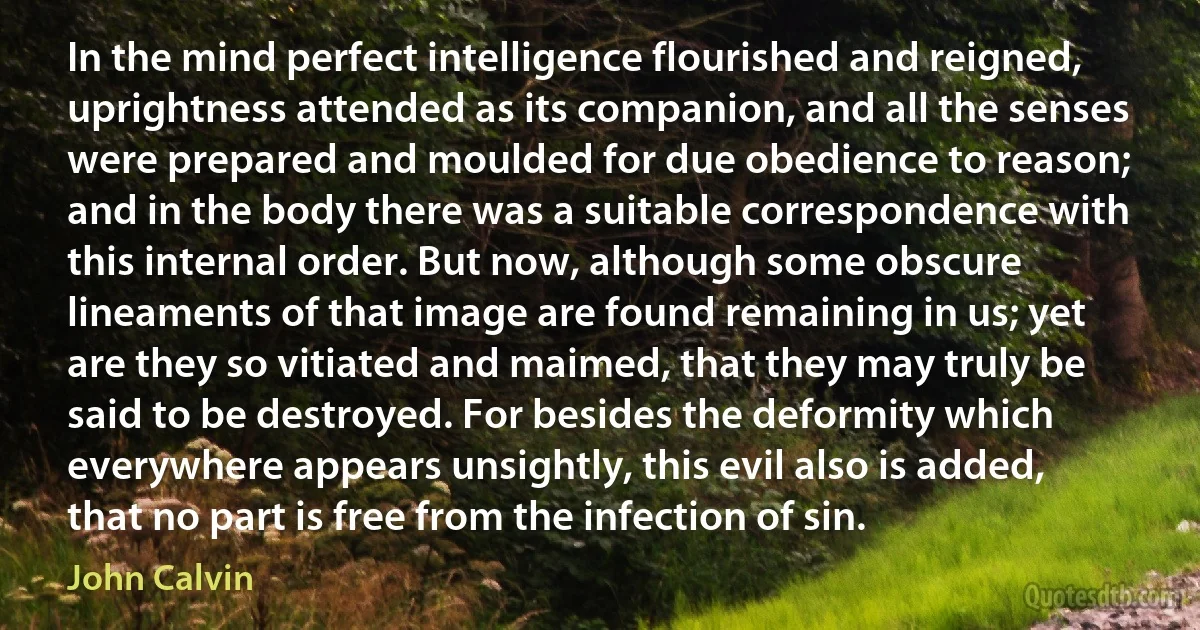Correspondence Quotes - page 2
Words are not deeds. In published poems - we think first of Eliot's "Jew", words edge closer to deeds. In Céline's anti-Semitic textbooks, words get as close to deeds as words can well get. Blood libels scrawled on front doors are deed.
In a correspondence, words are hardly even words. They are soundless cries and whispers, "gouts of bile," as Larkin characterized his political opinions, ways of saying, "Gloomy old sod, aren't I?" Or more simply, "Grrr."
Correspondences are self-dramatizations. Above all, a word in a letter is never your last word on any subject. There was no public side to Larkin's prejudices, and nothing that could be construed as a racist - the word suggest a system of thought, rather than an absence of thought, which would be closer to the reality, closer to the jolts and twitches of self response.

Martin Amis
Such was Gods Poem, this Worlds new Essay;
So wild and rude in its first draught it lay;
Th' ungovern'd parts no Correspondence knew,
An artless war from thwarting Motions grew;
Till they to Number and fixt Rules were brought
By the eternal Minds Poetique Thought.
Water and Air he for the Tenor chose,
Earth made the Base, the Treble Flame arose,
To th' active Moon a quick brisk stroke he gave,
To Saturns string a touch more soft and grave.
The motions Strait, and Round, and Swift, and Slow,
And Short, and Long, were mixt and woven so,
Did in such artful Figures smoothly fall,
As made this decent measur'd Dance of All.

Abraham Cowley
In my early twenties I read all Nietzsche-not just the main works but the minor works as well, all of them, and every scrap of published correspondence. Nietzsche alone of men out of books has a share in the loyalty and affectionate gratitude which otherwise belongs only to living teachers.

Enoch Powell
The strength of an organization lies in precise coordination of its parts, in strict correspondence of various mutually connected functions. This coordination is maintained through constant growth in tektological variety, but not without bounds: .. .there comes a moment when the parts of the whole become too differentiated in their organization and their resistance to the surrounding environment weakens. This leads sooner or later to disorganization.

Alexander Bogdanov
But how to write about a man who lived such a contemplative life marked by so few striking external events? He was extraordinarily private, and he kept his own person invisible in his writing. I had none of the material that ordinarily lends itself to narrative-no family dramas, no love affairs, jealousies, curious anecdotes, feuds, spats, or reunions. He had a large correspondence, but after his death his colleagues followed his instructions and removed almost all personal comments from his letters. No, not much external drama in his life: most scholars regard Spinoza as a placid and gentle soul-some compare his life to that of Christian saints, some even to Jesus.

Baruch Spinoza
Causality applies only to a system which is left undisturbed. If a system is small, we cannot observe it without producing a serious disturbance and hence we cannot expect to find any causal connexion between the results of our observations. Causality will still be assumed to apply to undisturbed systems and the equations which will be set up to describe an undisturbed system will be differential equations expressing a causal connexion between conditions at one time and conditions at a later time. These equations will be in close correspondence with the equations of classical mechanics, but they will be connected only indirectly with the results of observations.

Paul Dirac
There is exact correspondence between a world where everything seems to be in a state of mere "becoming,” leaving no place for the changeless and permanent, and the state of mind of men who find all reality in this same "becoming,” denying by implication true knowledge as well as the object of that knowledge, by which we mean the transcendent and universal principles.

René Guénon
Special Correspondence. I learn from a very high authority, whose name I am not at liberty to mention, (speaking to me at a place which I am not allowed to indicate and in a language which I am forbidden to use)-that Austria-Hungary is about to take a diplomatic step of the highest importance. What this step is, I am forbidden to say. But the consequences of it-which unfortunately I am pledged not to disclose-will be such as to effect results which I am not free to enumerate.

Stephen Leacock
The film has written and spoken dialogue in twenty-five languages-English, French, Japanese, Mandarin, Cantonese, Vietnamese, Latin, Hebrew, necrotic Egyptian ... and it has written calligraphic text on paper, wood, and flesh, on flat and curved surfaces, vertically and horizontally, on both living and dead flesh, in neon, on screens, in projection, as sub-title, inter-title, and sur-title, as High Art and low art, as advertisement and banker's check and registration plate, on photograph, on blackboard, as letter correspondence, as photocopy facsimile, and spoken, chanted, and sung, with and without music ... a mocking challenge. You want text? Cinema wants text? Cinema pretends to eschew text? Then we can give you text to mock that smug suggestion that cinema thinks it is pictures.

Peter Greenaway
If a man wants to succeed in his work, that is, to achieve the anticipated results, he must bring his ideas into correspondence with the laws of the objective external world; if they do not correspond, he will fail in his practice. After he fails, he draws his lessons, corrects his ideas to make them correspond to the laws of the external world, and can thus turn failure into success; this is what is meant by "failure is the mother of success" and "a fall into the pit, a gain in your wit".

Mao Zedong
There is a remarkably close parallel between the problems of the physicist and those of the cryptographer. The system on which a message is enciphered corresponds to the laws of the universe, the intercepted messages to the evidence available, the keys for a day or a message to important constants which have to be determined. The correspondence is very close, but the subject matter of cryptography is very easily dealt with by discrete machinery, physics not so easily.

Alan Turing
The particular conception of ideology operates primarily with a psychology of interests, while the total conception uses a more formal functional analysis, without any reference to motivations, confining itself to an objective description of the structural differences in minds operating in different social settings. The former assumes that this or that interest is the cause of a given lie or deception. The latter presupposes simply that there is a correspondence between a given social situation and a given perspective, point of view, or apperception mass. In this case, while an analysis of constellations of interests may often be necessary it is not to establish causal connections but to characterize the total situation. Thus interest psychology tends to be displaced by an analysis of the correspondence between the situation to be known and the forms of knowledge.

Karl Mannheim
...We beg leave to transport the reader to the back-parlour of the post-master's house at Fairport, where his wife, he himself being absent, was employed in assorting for delivery the letters which had come by the Edinburgh post. This is very often in country towns the period of the day when gossips find it particularly agreeable to call on the man or woman of letters, in order, from the outside of the epistles, and, if they are not belied, occasionally from the inside also, to amuse themselves with gleaning information, or forming conjectures about the correspondence and affairs of their neighbours. Two females of this description were, at the time we mention, assisting, or impeding, Mrs. Mailsetter in her official duty.

Walter Scott
I do not design a machine which will give the ignorant in astronomy a just view of the solar system, but would rather astonish the skilful and curious observer by a most accurate correspondence between the situations and motions of our little representatives of our heavenly bodies and the situations and motions of those bodies themselves. I would have my orrery really useful by making it capable of informing us truly of the astronomical phenomena for any particular point of time, which I do not find that any orrery yet made can do.

David Rittenhouse


![What Jesus reveals is not that laws disappear but that they must be kept through righteousness of a new kind, ... which is more complete because it supplements the deficiency in the laws. ... This expanded content we may call an inclination so to act as the laws may command, i. e., a unification of inclination with the law whereby the latter loses its form as law. This correspondence with inclination is the πληρωμα [fulfillment] of the law. (Georg Wilhelm Friedrich Hegel)](https://cdn.quotesdtb.com/img/quotes_images_webp/19/georg-wilhelm-friedrich-hegel-290919.webp)
